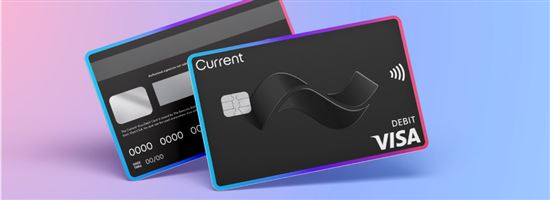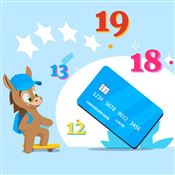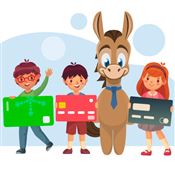Best Debit Card for Teens
Is your teenager ready to have a debit card? Take a look at the pros, cons, and fees of the top 8 best debit cards for teens.
 |
The best debit cards for teens offer safe spending, strong parental controls, savings tools, and even investing. Top picks include Greenlight (includes teen investing), Axos First Checking (a free account), and Acorns Early (for financial education).
Here's the quick comparison you need before choosing:
- Best Overall: Greenlight
A feature-rich teen debit card with chores, allowances, strong parental controls, and savings rewards. The standout feature is its investing platform—teens can start buying stocks with just $1, and parents approve every trade. - Best No-Fee Account: Axos First Checking
A free teen checking account (13+) with no monthly fees, no overdraft fees, and ATM fee reimbursements. Teens can spend, pay friends, and earn a bit of interest while parents monitor activity. - Best for Parental Controls: Acorns Early
Great for parents who want tighter oversight. This card offers some of the strongest parental controls—set spending limits, block merchant, get real-time alerts, and lock the card anytime. Teens learn through fun, game-style money lessons covering real-world topics. - Best Teen Checking Account: Chase First Banking
Chase First Banking is free for kids ages 6–17. Teens get savings goals, chores and allowance tools, and access to 15,000+ ATMs. Parents can set spending limits and track every purchase. However, it's only for Chase customers. - Best for Older Teens: Current Teen Banking
Designed for teens 13+, this free card offers higher spending limits (up to $2,000/day), savings goals, automatic round-ups, and charitable giving. A good fit for teens with growing independence or bigger purchases. - Best for Younger Teens & Tweens: Capital One MONEY
A simple, free checking account for kids 8+ with savings goals, mobile check deposits, and access to 70,000+ fee-free ATMs. Parents can set up allowances, monitor activity, and lock the card as needed. - Best for Multiple Kids: BusyKid
One low monthly fee covers up to 5 kids, making it ideal for big families. Includes chores & allowance tools, saving, donating, and a built-in investing platform. Note that parental controls are more limited. - Best for Financial Education: FamZoo
A hands-on money app with unique features like parent-paid interest and informal loans. Great for teaching teens budgeting, saving, debt, and real-world money management.
- Cost: Many basic teen debit cards are free, while paid options add features like rewards, investing tools, or financial education. Choose the plan that fits your teen's needs.
- Parental Controls: Look for ability to manage spending limits, block merchants, get real-time alerts, and approve transfers. These features help guide safe teen spending.
- Saving & Learning Tools: Savings goals, round-ups, chores and allowance automation, and educational content can help teens build strong money habits early.
- Funding Options: Check whether parents can fund via bank transfers. If your teen has a job, look for an account that allows for direct deposits too.
- ATM Access: Check how many fee-free ATMs are in the network. Plus, take note of ATM daily withdrawal limits.
Greenlight Banking for Kids and Teens
- Spend, save, and invest all in one app
- Customize chores and allowance
- Earn cashback & savings rewards
- Starts at $5.99/mo per family, for up to 5 kids
Read on to learn more about each card in detail, including fees, transaction limits, and their pros & cons.
The best debit cards for teens under 18 are:
- Best Overall: Greenlight
- Best for No Fees: Axos First Checking
- Best for Parental Controls: Acorns Early (formerly GoHenry)
- Best Teen Checking Account: Chase First Banking
- Best for Older Teens: Current Teen Banking
- Best for Younger Teens & Tweens: Capital One MONEY
- Best for Multiple Kids: BusyKid
- Best for Teaching Teens about Finances: FamZoo
Saving money is important, but so is learning to use it wisely.
Debit cards designed for teenagers can teach them how to handle money responsibly. These cards usually come with apps that let young people get to their money, save, and sometimes even invest.
Read on to discover some of the top debit cards worth considering. Plus, learn how to pick the right teen account for your child's safety.
Best Debit Card for Teens
 |
A debit card streamlines money management for teens and parents. Learn about the pros, cons, and fees of the top teen debit cards.
|
|
|
This rule helps parents and teens remember the key aspects to consider when choosing a debit card for teens:
- Control: Parents can set spending limits and monitor transactions.
- Access: Teens have access to their money when they need it.
- Safety: The card offers fraud protection and secure transactions.
- Habits: Encourages good financial habits and budgeting skills.
🏆 Best Overall: Greenlight
 |
| CREDIT: GREENLIGHT |
| Price |
|
|---|---|
| Age | No minimum |
| Minimum to Open | $1 with bank transfer or $20 with debit card |
| Daily Transaction Limits | $5,000 debit, $400 ATM (per cardholder's account)[1][2] |
| Key Features | Mastercard debit card, educational content, investment account, high savings reward, cash back, chores, allowance, charity donations, parental controls, identity theft protection |
Greenlight is one of the most comprehensive banking apps and debit cards for teens. Although the fee is higher than other banking apps for kids, the platform is packed with features you don't usually see, including quizzes, videos, and other educational content.
Consider it an investment in your child's future. You're getting much more than just a debit card.
The standout feature is Greenlight's investing platform. Your teen can invest in their favorite companies right from the app, starting with just $1. Greenlight provides teens with the tools to safely dip their toes into investing.
Features for each plan include:
- Greenlight Core: $5.99/mo. Includes a debit card, educational app, parental controls, and 2% savings reward.
- Greenlight Max: $10.98/mo. Adds perks like an investing platform, 1% cash back, 3% savings reward, priority customer support, and protection plans.
- Greenlight Infinity: $15.98/mo. Adds safety features like family location sharing, crash detection and SOS alert, driving reports and alerts. Plus, an increased 5% savings reward.
- Greenlight Family Shield: $24.98/mo. Adds financial account monitoring, suspicious activity alerts,up to $100K deceptive transfer fraud coverage, up to $1M identity theft coverage, and 6% savings reward.
The fee covers up to 5 children and debit cards per family. This is good bang for your buck for big families.
Pros + Cons
|
|
Other Fees[3]
- Card Replacement: $3.50 (first replacement free)
- Expedited Card Delivery: $24.99
- Custom Card Fee: $9.99
Best for No Fees: Axos First Checking
| Price | $0/mo. |
|---|---|
| Age | 13+ years old |
| Minimum to Open | $0 |
| Daily Transaction Limits | $500 debit, $100 ATM[4] |
| Key Features | Visa debit card, earn interest, ATM fee reimbursements, peer-to-peer payments, parental monitoring |
Axos First Checking is a good first step into banking and financial responsibility for teens. It allows teens to not just manage their money, but also grow it a bit with interest.
And it's practically fee-free. There are no monthly fees and no overdraft fees. And Axos even reimburses up to $12 in domestic ATM fees per month.
Your kid can use the debit card online, in stores, with a mobile payment app, and at ATMs. In the app, teens can send money to their friends and even pay bills. That can give them an early taste of adulting life.
Parents can monitor spending activity, but there are no spending control options. But with low daily limits and no overdraft fees, you'll have peace of mind knowing they won't overspend or rack up expected charges.
Overall, Axos First Checking provides a blend of financial independence for teens and oversight for parents - all without hidden costs.
Pros + Cons
|
|
Other Fees[4]
- Expedited Card Delivery: $50
First Checking - 0.10% APY
- Joint checking account for 13-17 year olds
- No fees
- Up to $12 domestic ATM fee reimbursements per month
Empower your child's financial journey with the next teen debit card, where learning about money is as fun as playing a game.
Best for Parental Controls: Acorns Early (formerly GoHenry)
| Price | Individual Child - $5 per month Family Plan - $10 per month[5] |
|---|---|
| Age | 6+ years old |
| Minimum to Open | $0 |
| Daily Transaction Limits | Teens (13+): $60 debit, $60 ATM Parent Account: $2,500 debit, $120 ATM[6] |
| Key Features | Mastercard debit card, educational games, chores, allowance, parental controls |
Acorns Early takes a bit of a different approach to financial education by offering it in a game format. Kids and teens can complete missions to earn experience points, level up, and progress through the game. Teens can learn about more advanced financial topics like investing and entrepreneurship.
The platform is great for parents who want more control over their kids' accounts. You choose where they can use their card and how much they can spend weekly or at one time. Plus, you get real-time account notifications and easily lock the card if you need to.
You can even block merchants that sell age-restricted things (like alcohol), so your kid can't use their card at those places.
Acorns Early can be a cost-effective option if you need a debit card for several children. There are other debit cards for kids and teens that charge lower monthly fees. But if you want a platform that includes financial education, it's a good pick.
Pros + Cons
|
|
Account Details[6]
- ATM Fee: Free (ATM operator fees still apply)
- Card Replacement (same design): Free
- Card Replacement (different design): $5
- Custom Card Fee: $5
Acorns Early Kids' Debit Card
- Real-time spend notifications.
- Block and unblock cards easily.
- Teach financial independence safely.
Imagine a debit card that grows with your teen. The next card does just that, blending savings goals with practical money management
Best Teen Checking Account: Chase First Banking
| Price | $0 |
|---|---|
| Age | 6-17 years old |
| Minimum to Open | $0 |
| Daily Transaction Limits | $400 debit, $100 ATM[7] |
| Key Features | Visa debit card, savings goals, chores, allowance, Chase ATM access, parental controls |
Chase First Banking is a great free checking account for teens. It gives your teen access to over 15,000 Chase ATMs and over 5,000 branches across the U.S. This account is only open to kids of current Chase checking customers.
The mobile app lets teens set savings goals and earn their allowance by completing chores. Parents can set spending limits and stay up to date on account activity with instant notifications. The parental controls are very flexible, so it's a good choice no matter your parenting style.
Keep in mind, transaction limits are pretty low with Chase First Banking. If your kid wants to save for a big purchase like a laptop, this might not be the best option.
Pros + Cons
|
|
Other Fees[7]
- Out-of-Network ATM Fee: $3 fee per withdrawal at a non-Chase ATM in the U.S. and the U.S. territories. $5 fee per withdrawal at a non-Chase ATM outside of the U.S. and the U.S. territories. Surcharge Fees from the ATM owner/network still apply. U.S. territories include American Samoa, Guam, the Northern Mariana Islands, Puerto Rico and the U.S. Virgin Islands.
- Foreign Transaction Fee: 3%
- Expedited Card Delivery: $15
- Chase Total Checking
- Chase Secure Banking
- Chase Business Checking
For older teens craving independence, the next debit card offers the freedom they want with the oversight you need.
Best for Older Teens: Current Teen Banking
 |
| CREDIT: current |
| Price | $0 |
|---|---|
| Age | 13+ years old |
| Minimum to Open | $0 |
| Daily Transaction Limits | $2,000 debit, $500 ATM[8] |
| Key Features | Visa debit card, savings goals, round-ups, chores, allowance, charity donation, parental controls |
Current Teen Banking offers a debit card and banking app designed to help teens spend, save, earn, and donate money to charity. It's also a great option for co-parenting since it supports multiple funding sources.
The account has a couple of clever features to help your child save. Teens can set up their own personalized saving goals. It also offers the ability to automate savings with the round-ups feature. Transactions are rounded up to the nearest dollar, and the difference is put directly into savings.
Current is a solid option for older teens. The daily card spending limit is $2,000 - a lot higher than most teen debit cards. So it's great for teens saving up for bigger purchases as they enter college or adult lives.
But that said, parents can always adjust the daily limits and block merchants to have more control over their kids' spending.
Pros + Cons
|
|
Other Fees[9]
- Out-of-Network ATM Fee: $2.50
- International ATM Fee: $3 + 3%
- Foreign Transaction Fee: 3%
- Card Replacement: $5
Convenient Teen Account With Debit Card
- Easy transfers, set spending limits, automate allowances
- Age: 13 years and older
- Fees: No monthly or annual fee
Young teens aren't left out! The next checking account brings a balanced approach to spending and saving.
Best for Younger Teens & Tweens: Capital One MONEY
| Price | $0/mo. |
|---|---|
| Age | 8+ years old |
| Minimum to Open | $0 |
| Daily Transaction Limits | $500 debit, $500 ATM[10] |
| Key Features | Mastercard debit card, earn interest, over 70,000 fee-free ATMs, savings goals, parental controls |
Capital One Money is a great checking account for teens and even younger. The debit card can be used online, in stores, and at more than 70,000 ATMs nationwide. But keep in mind that you can only deposit cash at select ATMs.
Teens can make purchases, deposit checks, and set up savings goals. They can decide how much money to set aside for saving or spending.
Parents can set up allowances, view all account activity, set up notifications, and lock the debit card through the app. You won't be able to set your own spending limits, but the low transaction limits will prevent teens from overspending.
If you need a simple and free checking account for your teen, this is a good choice.
Pros + Cons
|
|
Other Fees[11]
- Expedited Card Delivery: $25
Have multiple kids? The next card simplifies it all, with features that teach and tools that empower.
Best for Multiple Kids: BusyKid
| Price | $4 per month (billed annually at $48) |
|---|---|
| Age | 5+ years old |
| Minimum to Open | $0 |
| Daily Transaction Limits | $2,000 debit, $810 ATM[12] |
| Key Features | Visa debit card, chores, allowance, savings, donate to charity, investment account, parental controls |
BusyKid is a great pick if you need a debit card for multiple children. The monthly fee covers up to 5 children per family, which is a good deal compared to other paid platforms. Plus, it comes with an investment account for kids and teens.
Parental controls are a bit limited with this app. There's no option to set specific spending limits, but parental approval is required whenever your kid moves money. For example, if your teen wants to move money from their savings to their spending, you'll need to approve it first.
BusyKid is a solid choice to keep track of spending and allowances for multiple kids. And it's a good way to start investing at a young age.
Pros + Cons
|
|
Other Fees[13]
- Declined Purchase Fee: $0.50
- Foreign Currency Conversion: 3%
- Foreign Transaction Fee: $2.50
- Card Replacement: $5
- ATM Fee: $1.50
Best for Teaching Teens about Finances: FamZoo
| Price | $5.99 per month, OR $59.90 for 12 months |
|---|---|
| Age | No minimum |
| Minimum to Open | $0 |
| Daily Transaction Limits | $5,000 debit, $510 ATM[14] |
| Key Features | Mastercard debit card, subaccounts, parent-paid interest, family billing, informal loans, chores, allowances, parental controls |
FamZoo is a teen debit card and banking app with interesting ways to teach teens about money management skills. It can help your teen learn how to budget and spend wisely. Plus, it offers unique features you don't commonly see in other teen banking apps.
Parents can set up informal loans, complete with accrued interest that your kid needs to repay. You can also pay interest on your teen's savings to teach an important lesson about compound interest. These features help illustrate how borrowing and investing money work in the real world.
FamZoo is great for parents who want a hands-on approach to teaching kids about financial responsibility.
Pros + Cons
|
|
Other Fees[15]
- Additional Card Fee: $3.00 (first 4 cards free)
- Card Replacement: $3.00 (first 3 replacements free)
- Expedited Card Delivery: $25
- Cash Reload Fee: Up to $4.95
FamZoo Prepaid Card for Kids and Teens
- Order Online
- No Credit Check
- Try for Free
What to Look for in a Debit Card for Teens
Before you choose a debit card for your teenager, think about which features are most important to you. Then, you can compare costs and find the right platform that fits your needs.
Here are some features to consider in a teen debit card:
Monthly Fee
There are many free debit cards available for teens. But paid options often come with helpful features. Be sure to understand how many children are covered by the monthly fee. If the fee covers just one child, it could be costly for families with multiple kids.
Parental Controls
How much control do you want over your child's finances? If your answer is "a lot," look for apps that let you set spending limits for specific stores and categories. This gives you the most control.
If you want to give your kid some freedom, an app that simply lets you monitor spending behavior could suffice. Most apps let you set up account alerts, so you can stay up-to-date with every purchase.
Security
Your child's debit card should come with built-in security measures to keep your money and info safe. Be sure to choose a debit card that's issued by an FDIC-insured bank, which protects up to $250,000 of your money in case the bank ever fails.
(All the accounts we mentioned have funds held in FDIC-insured banks.)
Investment Account
The younger kids start investing, the better. Keep an eye out for banking apps that offer both a debit card and an investing platform. These apps usually let kids invest in fractional shares, so you can get started with little money.
Savings Goals
Teens can learn how to set financial goals and slowly work toward them. This is a great tool to teach your kids financial responsibility. Savings goals can encourage kids to think ahead and put away money for the things they need.
Direct Deposit
Once your kid starts working, they're going to need a bank account to manage paychecks. Direct deposit is one of the most convenient ways to do so. Some accounts even offer early direct deposit. This can help your teen get their paycheck up to two days earlier.
Educational Content
The right app can help your teen learn about personal finance and gain confidence with money. Try to determine what kind of format is best for your kid. If your kid likes mobile gaming, for example, a platform that gamifies money lessons could be the best choice.
How Old Do You Have to Be to Get a Debit Card?
Generally, you must be at least 13 years old to get a debit card.
Some debit cards have even lower age requirements or no age requirements at all. Most debit cards with no age requirements unfortunately have a monthly fee.
Every account is unique, so check the age requirements of the platform you want before you jump in.
How to Open a Children's Debit Card
Signing up for a debit card for teens and kids is pretty straightforward. Specific requirements differ for each account, but here's some basic information you might need to get started:
- Full name
- Phone number
- Email
- Address
- Date of birth
- Social Security number
- Driver's license
- Your child's information
In general, here's what to expect if you want to create an account for your child:
- Go to the company's website or download the app.
- Click sign up to create an account.
- Fill out the form with your personal information and your kid's information.
- Confirm your details.
- Select and order your debit cards.
- Receive your card in the mail in about a week.
Some debit cards are available digitally before the physical card arrives. You can use your digital card online or add it to your mobile wallet to use it on the go.
What the Experts Say
CreditDonkey asked a panel of industry experts to answer readers' most pressing questions on debit cards for teens. Here's what they said:
Bottom Line
As teenagers approach adulthood, they'll need a debit card and a banking platform to handle their money. Many of these debit cards are free and offer a functional app with features that help kids learn more about finances.
Figure out which features are non-negotiable to you. Do you need a platform that offers investing along with a debit card? Do you need robust parental controls, or is it better to give your kid some responsibility?
Once you figure out what your family needs, you can compare products to find the best one at the best price.
All Ages - Banking and Invest in One App
- Flexible controls, spending notifications, in-app chore list
- Age: No minimum age
- Fees: Starts at $5.99/month, per family (up to 5 kids). $10.98/month for Greenlight Max. $15.98/month for Greenlight Infinity. $24.98/month for Greenlight Family Shield.
Not ready to pick a debit card just yet? Read these to learn more about your options:
References
- ^ Greenlight. Are there funding and spending limits for my account?, Retrieved 10/13/2025
- ^ Greenlight. How much can I withdraw from an ATM per day and per month?, Retrieved 10/13/2025
- ^ Greenlight. List of all fees for Greenlight Prepaid Mastercard, Retrieved 10/13/2025
- ^ Axos Bank. Personal Deposit Account Agreement and Schedule of Fees, Retrieved 10/13/2025
- ^ Acorns. Acorns Early: Pricing, Retrieved 10/13/2025
- ^ Acorns. Acorns Early Cardholder Terms and Conditions, Retrieved 10/13/2025
- ^ Chase. Additional Banking Services and Fees: Deposit Account Agreement - Fee Schedule, Retrieved 10/13/2025
- ^ Current. Current Deposit Account Agreement, Retrieved 10/13/2025
- ^ Current. Deposit Account Agreement: Fee Schedule, Retrieved 10/13/2025
- ^ Capital One. Teen Checking Account Money Disclosures, Retrieved 10/13/2025
- ^ Capital One. MONEY account disclosures, Retrieved 10/13/2025
- ^ BusyKid. Cardholder Agreement Busykid Spend Card, Retrieved 10/13/2025
- ^ BusyKid. Prepaid Card Cardholder Agreement, Retrieved 10/13/2025
- ^ FamZoo Prepaid Card FAQs: Are there any amount or frequency limits on card usage?, Retrieved 10/13/2025
- ^ FamZoo. Fee Disclosures, Retrieved 10/13/2025
Donna Tang is a content associate at CreditDonkey, a credit card comparison and reviews website. Write to Donna Tang at donna.tang@creditdonkey.com. Follow us on Twitter and Facebook for our latest posts.
Note: This website is made possible through financial relationships with some of the products and services mentioned on this site. We may receive compensation if you shop through links in our content. You do not have to use our links, but you help support CreditDonkey if you do.
|
|
| ||||||
|
|
|











